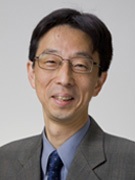Course of
Linguistics and Literature
Professor TAKAYAMA Tomoaki (Japanese Language and Literature)
| [Theme] | Changes of Sound Combination in the Japanese Language |
|---|

Many people consider Japanese as being composed of kanji, hiragana, and katakana. However, before people begin to learn how to write, they are forced to begin learning how to speak as infants. What they encounter first is sound. Words originate not as writing but sound (in sign language, movements fulfill this role instead). This naturally applies to Japanese as well.
For instance, you can probably get along without too much trouble even if you do not know how to write "keitai no juudenki" (cell phone charger) in kanji. However, if you cannot remember or do not know the pronunciation of a particular word, then it is a different story. The role of sounds in daily Japanese is incomparably large.
The main theme of my research is the issue of sound in Japanese. Or more specifically, I investigate how Japanese is structured in terms of sound, and how this structure has changed from the past to the present.
The pronunciations in Japanese are changing gradually. What I am interested in are the changes of the manner in which sounds are combined. For instance, it is considered that during the Heian Period, the "keu" of "mukutsukeu sarete" was pronounced as "keu." Although it was not unusual during this period for vowel sequences such as "eu" to appear in a single word, they later disappeared from Japanese. This indicates a change in the phonotactics.
How can we learn about the sounds of old Japanese? Of course no voice recording existed, so there is no way we can conduct research directly on the sounds of old eras. However, owing to various pieces of indirect evidence, we have been able to grasp a certain amount of its characteristics.
It should also be noted that the transformation of sound is a complex phenomenon that cannot be explained simply by saying that sounds change to make pronunciation easier. A recent example of this is the change from "fun'iki" (atmosphere) in the older generation to "fuinki" in the younger generation. A few years ago, when I asked my students during a lecture whether they thought (or once thought) "fuinki" was correct, it turned out that the majority of them did. With the "n" having switched places with the "i," it may seem as though the pronunciation would be quite different. However, the everyday pronunciation has not changed much. It is even probable that the older generation hears it as "fun'iki" while the younger hears it as "fuinki." One of the reasons for this change is that this word is often used in everyday speech and frequently in conversations with quick pronunciation.
My ultimate goal is to understand the nature of the human language through the sound changes of the Japanese language.

